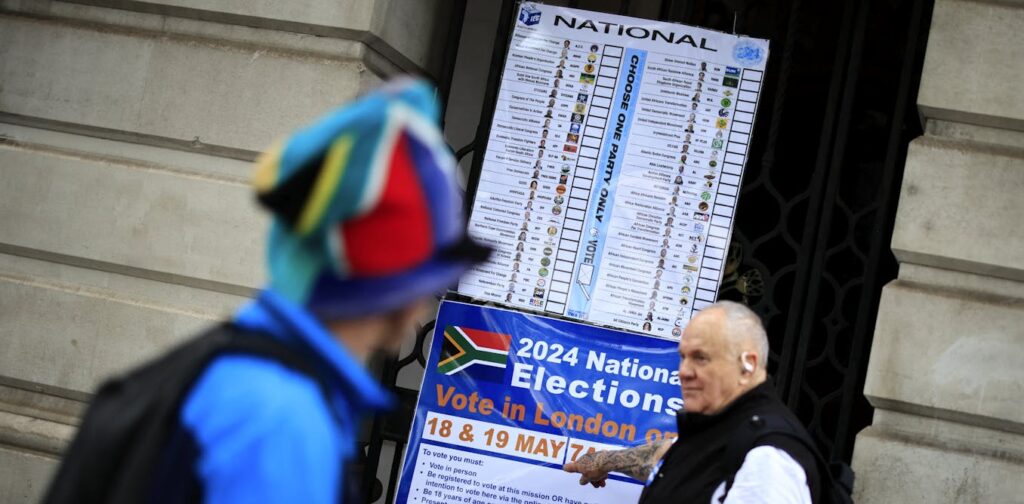South Africa's seventh general election since democratization in 1994 is scheduled for May 29, 2024, but it will take place under circumstances unlike any other in the country's history. Some see the fiercely contested national and provincial elections as a watershed moment for the country. Political scientist Dirk Kotze explains the changing landscape..
A new election law has come into force. How does this affect the ballot and voter choices?
Under the new electoral system, voters will receive three ballots instead of the previous two: two national ballots (a regional ballot and a compensation ballot) and one state ballot.
The first, the national vote, lists the political parties competing for the 200 national parliamentary seats. The second, the provincial regional vote, is for the nine provincial parties and independent candidates competing for the remaining 200 parliamentary seats. There are a total of 400 parliamentary seats. The third, the provincial vote, is for the provincial assemblies. South Africa has nine provinces.
Voters therefore have to make three choices: two for the National Assembly and one for the state assembly. This allows for “strategic” voting: voters can choose between different parties (or parties and independent candidates) at the national level, or they can vote for one party at the national level and another party (or independent candidate) at the state level.
The revised electoral system also allows, for the first time, independent candidates to run at both the national and state levels.
The new system will therefore be a combination of party lists and individual candidates. The new lists for state legislatures will look the same as the national “regional” lists.
What about the options on the ballot?
The number of parties to choose from on the ballot for national elections has increased from 48 in 2019 to 52 in 2024. Nineteen parties took part in the first national elections in 1994. The number of parties has not increased dramatically since the most recent elections, but has grown gradually over three decades.
Over the last 30 years, the number of political parties with seats in the National Assembly has remained relatively constant at around 14. In 1994, three parties – the African National Congress (ANC), the New National Party (NNP) and the Inkatha Freedom Party (IFP) – each had more than 10% of the support at the national level. This changed in 1999 with a dramatic decline in support for the NNP and the rise of the Democratic Alliance (DA). The NNP was dissolved in 2005.
The Inkatha Freedom Party also saw its popularity decline between 2009 and 2016, but has since begun to recover. Newcomers include the Congress of the People (Coop) (2009) and the Economic Freedom Fighters (EFF) (2014). Coop has almost disappeared, while the DA and EFF have increased their popularity from 10% to 20%.
The main options for 2024 are therefore the ANC, DA, EFF and IFP, followed by smaller parties with 1% to 2% support. The latest addition is the Umkhonto weSizwe Party (MK Party), led by former president Jacob Zuma. The party's popularity is still unknown, but it seems to have great potential in KwaZulu-Natal. Opinion polls suggest that the party has around 8% support nationwide. In principle, the main contest would be between five and eight parties. This would establish a true multi-party system. It would also allow for some coalition government options.
The ruling party is at risk of losing 50%. What does this mean?
The 2024 elections may be a key milestone as they could see the formation of a national coalition government for the first time since 1994. It would be different to the 1994-1999 Government of National Unity (comprised of the ANC, NNP and IFP), which was a super-sized grand coalition government agreed before the elections as part of a negotiated transition; that is, it would not be a traditional coalition government.
It is highly likely that the ruling ANC will receive less than 50%+1 of the vote at the national level or in some provincial assemblies, as it has been the dominant party for 30 years.
This is not unusual: India, Sweden, Japan, Botswana, Mexico, Namibia, Mozambique and Zimbabwe have had or still have dominant parties in the past. In South Africa, this situation began to change at the local government level in 2016. The dominance of the ANC in South African politics is based on the fact that before 1990, the ANC (along with the Pan-African Congress of Azania) established itself as an internationally recognised liberation movement for South Africa.
The ANC also enjoyed high status as the party of a world-famous leader, the late Nelson Mandela. It was internationally recognised even before it was elected into the South African government. It had a moral high ground that other parties could not challenge. That moral status and public support is now in jeopardy. The risk for the ANC is that if it loses its sole power, it may enter into an accelerating decline with no chance of recovery.


